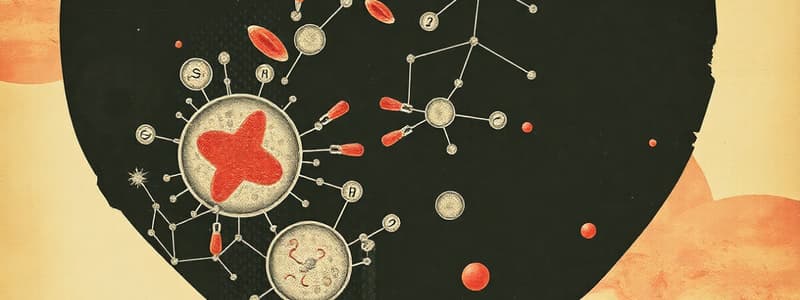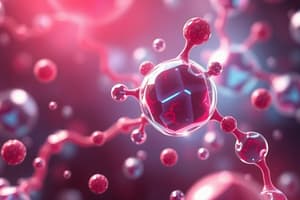Podcast
Questions and Answers
Which plasma protein is responsible for the majority of the plasma colloidal osmotic pressure?
Which plasma protein is responsible for the majority of the plasma colloidal osmotic pressure?
- Immunoglobulins
- Fibrinogen
- Globulins
- Albumin (correct)
Where are globulins primarily synthesized in the body?
Where are globulins primarily synthesized in the body?
- Liver, spleen, bone marrow, and lymph glands (correct)
- Only in the liver
- Spleen and lungs
- Bone marrow and lymph glands
What is the approximate range of plasma colloidal osmotic pressure?
What is the approximate range of plasma colloidal osmotic pressure?
- 15-20 mmHg
- 10-15 mmHg
- 25-30 mmHg (correct)
- 30-35 mmHg
Which function do plasma proteins primarily perform to assist in the immune response?
Which function do plasma proteins primarily perform to assist in the immune response?
Which plasma protein is crucial for the process of clot formation?
Which plasma protein is crucial for the process of clot formation?
Flashcards
Plasma proteins
Plasma proteins
Proteins found in plasma, crucial for various bodily functions.
Albumin
Albumin
A plasma protein, primarily made by the liver, maintaining water balance.
Globulins
Globulins
Plasma proteins involved in immunity and transporting substances.
Fibrinogen
Fibrinogen
Signup and view all the flashcards
Colloidal osmotic pressure
Colloidal osmotic pressure
Signup and view all the flashcards
Plasma Protein's role in Defence
Plasma Protein's role in Defence
Signup and view all the flashcards
Plasma protein's role in Clotting
Plasma protein's role in Clotting
Signup and view all the flashcards
Plasma's role in Viscosity
Plasma's role in Viscosity
Signup and view all the flashcards
Plasma protein's role as Carriers
Plasma protein's role as Carriers
Signup and view all the flashcards
Liver's role in plasma protein synthesis
Liver's role in plasma protein synthesis
Signup and view all the flashcards
Study Notes
Plasma Composition
- 100 cc of plasma contains 7-8 gm of plasma proteins
- Albumin: 4.5 gm
- Globulins: 2.7 gm
- Fibrinogen: 0.4 gm
Plasma Protein Synthesis
- Albumin and fibrinogen are produced by the liver
- Globulins are produced in the liver, spleen, bone marrow, and lymph glands
Plasma Protein Functions
- Maintenance of Colloidal Osmotic Pressure:
- Achieved primarily by albumin
- Approximately 25-30 mmHg
- Important for water exchange between blood and tissues, regulating blood volume
- Defense Function:
- Antibodies (primarily gamma-globulins) play a crucial role in fighting viruses and bacteria, protecting the body
- Clot Formation:
- Fibrinogen is essential for blood clot formation
- Viscosity:
- Plasma proteins, especially fibrinogen, contribute to blood viscosity, which is vital for maintaining arterial blood pressure
- Carriers:
- Plasma proteins transport hormones (e.g., thyroid, gonadal hormones), metal ions, fatty acids, and drugs.
Studying That Suits You
Use AI to generate personalized quizzes and flashcards to suit your learning preferences.




